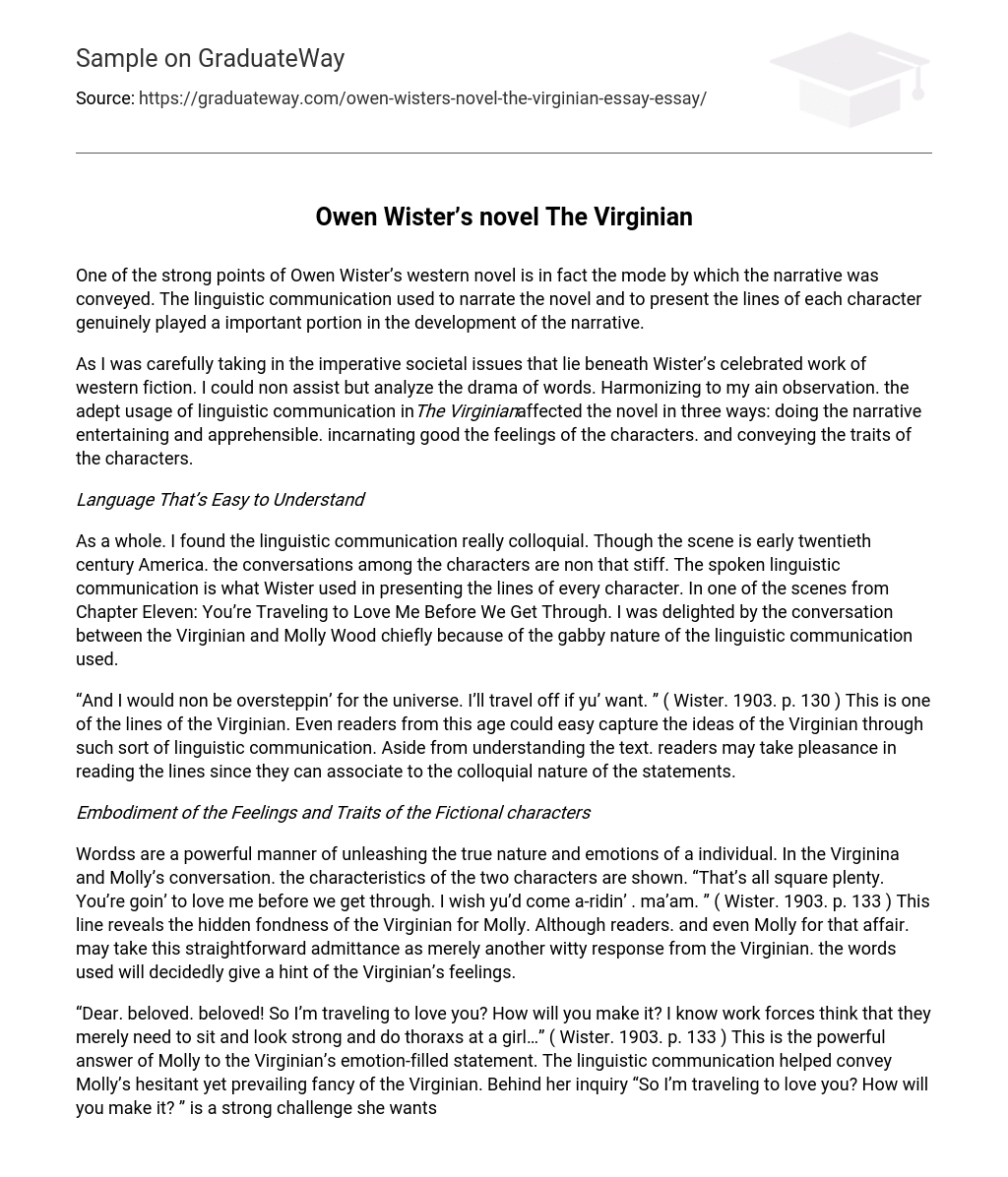One of the strong points of Owen Wister’s western novel is in fact the mode by which the narrative was conveyed. The linguistic communication used to narrate the novel and to present the lines of each character genuinely played a important portion in the development of the narrative.
As I was carefully taking in the imperative societal issues that lie beneath Wister’s celebrated work of western fiction. I could non assist but analyze the drama of words. Harmonizing to my ain observation. the adept usage of linguistic communication inThe Virginianaffected the novel in three ways: doing the narrative entertaining and apprehensible. incarnating good the feelings of the characters. and conveying the traits of the characters.
Language That’s Easy to Understand
As a whole. I found the linguistic communication really colloquial. Though the scene is early twentieth century America. the conversations among the characters are non that stiff. The spoken linguistic communication is what Wister used in presenting the lines of every character. In one of the scenes from Chapter Eleven: You’re Traveling to Love Me Before We Get Through. I was delighted by the conversation between the Virginian and Molly Wood chiefly because of the gabby nature of the linguistic communication used.
“And I would non be oversteppin’ for the universe. I’ll travel off if yu’ want. ” ( Wister. 1903. p. 130 ) This is one of the lines of the Virginian. Even readers from this age could easy capture the ideas of the Virginian through such sort of linguistic communication. Aside from understanding the text. readers may take pleasance in reading the lines since they can associate to the colloquial nature of the statements.
Embodiment of the Feelings and Traits of the Fictional characters
Wordss are a powerful manner of unleashing the true nature and emotions of a individual. In the Virginina and Molly’s conversation. the characteristics of the two characters are shown. “That’s all square plenty. You’re goin’ to love me before we get through. I wish yu’d come a-ridin’ . ma’am. ” ( Wister. 1903. p. 133 ) This line reveals the hidden fondness of the Virginian for Molly. Although readers. and even Molly for that affair. may take this straightforward admittance as merely another witty response from the Virginian. the words used will decidedly give a hint of the Virginian’s feelings.
“Dear. beloved. beloved! So I’m traveling to love you? How will you make it? I know work forces think that they merely need to sit and look strong and do thoraxs at a girl…” ( Wister. 1903. p. 133 ) This is the powerful answer of Molly to the Virginian’s emotion-filled statement. The linguistic communication helped convey Molly’s hesitant yet prevailing fancy of the Virginian. Behind her inquiry “So I’m traveling to love you? How will you make it? ” is a strong challenge she wants the Virginian to take earnestly.
Making Known the Traits of the Fictional characters
“Why. I mean. ” said he. easy. sitting down near the door. “that it’s Sunday. School don’t hinder yu’ from enjoyin’ a ride to-day. You’ll teach the childs all the better for it to-morro’ . ma’am. Possibly it’s your responsibility. ” ( Wister. 1903. p. 130 ) This is one illustration of how linguistic communication presented the traits of the Virginian to the readers. The pick of words for the character of the Virginian is suited to his nature as a gentleman who shows uttermost concern for a lady.
Mention:
Wister. O. ( 1903 ) The Virginian: A Horseman of the Plains. New York: The Macmillan Company





